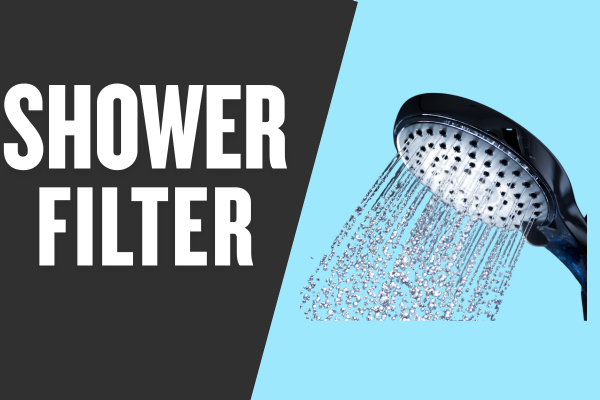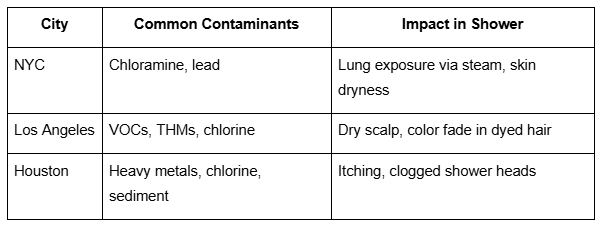Is a Shower Filter Worth It? What’s Really in Your Water


Content
Do You Really Need a Shower Filter? What’s Hiding in Your Water
For many people, filtered drinking water is non-negotiable. But few stop to question what’s in the water coming from their shower. Every time you step into a hot shower, you're not only soaking your skin, you’re also breathing in chemical vapors rising from your local water supply.
Shower filters in cities with documented contaminants in their tap water may play a far more important role. Understanding how contaminants behave during showers can change the way you think about water safety, beyond what you drink.
Summary
Shower filters help reduce chlorine, chloramine, and volatile organic compounds (VOCs) that are present in tap water. During hot showers, these contaminants convert into steam and gas, which can be inhaled or absorbed through skin. Common health effects include dry skin, itching, scalp irritation, and exacerbation of eczema.
Cities like New York, Los Angeles, and Houston report elevated levels of chlorine byproducts and metals in municipal water. Shower filters with KDF, carbon, or Vitamin C can lower exposure, especially in areas with hard water or high chlorine content.
A shower filter is most useful when local water contains chemical disinfectants or heavy metals, which can irritate skin and cause respiratory exposure through steam.
Why Shower Water Might Be More Harmful Than Drinking Water
When water is heated, volatile compounds like trihalomethanes (THMs) and chlorine gas become more concentrated in the air. This steam is inhaled directly into the lungs, a more immediate exposure path than ingestion. According to the EPA, some disinfection byproducts carry long-term health risks, especially for sensitive individuals.
Unlike filtered tap water, shower water hits your skin at high pressure and temperature, allowing chlorine and other chemicals to strip oils from the skin, disrupt the pH barrier, and worsen conditions like eczema or dandruff.
What’s Actually in Your Shower Water?
Municipal water is disinfected with either chlorine or chloramine, both of which leave residual compounds in the supply. Here’s what shows up in major cities:

Most of these contaminants are not removed by taste or smell alone, which is why testing your tap source or checking your city’s water report is essential. Tools like the H2OScore filter guide offer matched recommendations based on actual lab data, not assumptions.
Health Effects Reported by Users
Thousands of users tell a similar story:
- “Filtered showers helped my eczema calm down.”
- “My hair holds color longer after switching to a filter.”
- “I didn’t realize chlorine was the reason my scalp was so dry.”
Even users in cities with “safe” water noticed that skin texture, irritation, and breakouts improved after installing basic inline filters. These filters help remove residual chlorine, which many dermatologists link to disrupted skin microbiomes.
How Shower Filters Actually Work
Shower filters don’t soften water in the same way a full-home system would. However, they target specific chemicals using filtration media such as:
- KDF (Kinetic Degradation Fluxion): Removes chlorine, hydrogen sulfide, and some metals
- Activated Carbon: Absorbs organic compounds and VOCs
- Vitamin C Filters: Neutralize chloramine and chlorine gas effectively
Some filters combine two or more of these to provide layered protection. Look for filters that are NSF-certified for chemical reduction, not just labeled “universal.”
When You Should Consider Using a Shower Filter
You may benefit from a shower filter if:
- Your city uses chloramine or high-chlorine disinfection
- You have sensitive skin, eczema, or dyed hair
- Your home has old plumbing (potential for lead or copper exposure)
- You live in an area with hard water or high mineral content
If you’re unsure what’s in your water, scan your source using the H2OScore app. It provides a breakdown of local contaminants and matches filters that actually reduce those specific risks.
How to Choose the Right Filter
Not all shower filters perform equally. The right filter depends on the chemistry of your local water and the exposure risks you’re trying to reduce.
Key things to check:
- Lab-tested removal rates (not marketing claims)
- Filter media appropriate for your region (e.g., Vitamin C for chloramine-heavy cities)
- Longevity and replacement costs (filters expire faster with hard water)
Want to know if your shower water is safe? Use the H2OScore app to scan your source and find a matched filter based on real contaminant data. Analyze My Shower Water.


